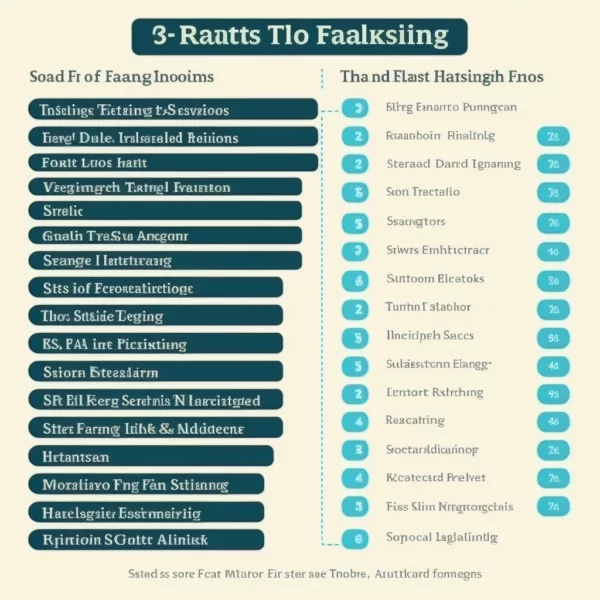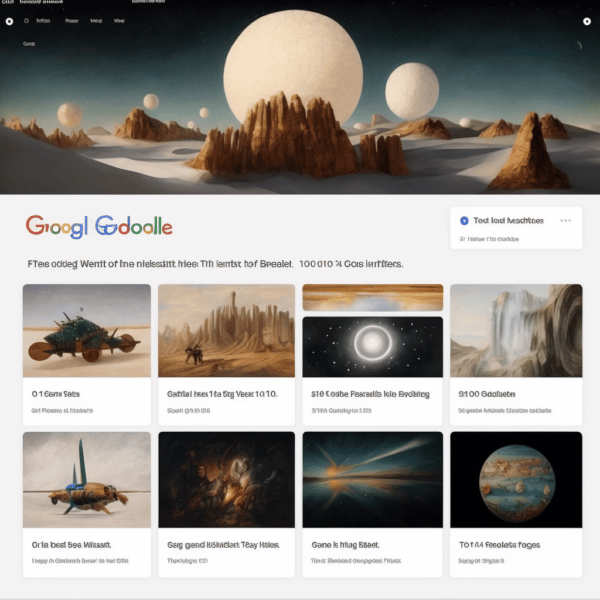
What are SEO Ranking Factors?
1. A Secure and Accessible Website
A website’s SEO ranking is affected by how secure and easy to use it is. This is because search engines like Google use a website’s security and ease of use to judge how credible and trustworthy it is.
A website that uses HTTPS encryption to send data securely and is made so that people with disabilities can use it will rank higher in search engines than a website that doesn’t do either of these things. Google likes sites that are easy to use, load quickly, and can be viewed on mobile devices. Make your website secure and “human friendly” if you want to get the most out of it.
2. Page Speed (Including Mobile Page Speed)
Page speed, including mobile page speed, is an important SEO ranking factor because it directly affects the user experience.
Search engines like Google want their users to have the best experience possible, so they give more weight to websites that load quickly and are easy to use.
When a website takes too long to load, users are likely to get frustrated and may even leave the site before it finishes loading. This not only makes the user experience bad, but it also makes the bounce rate go up. High bounce rates can tell search engines that a website doesn’t have good content or a good user experience – this will hurt its search engine rankings.
Since more and more people are using their phones to go online, mobile page speed has become an even more important SEO technique and ranking factor.
Google has said that the speed of a mobile page is now a ranking factor for mobile search results. (Pay attention when they tell you!)
This makes sense, since most people who use the internet do so on their phones. A website that loads fast and is easy to use on a small screen will rank higher in mobile search results than one that takes a long time to load or is hard to use on a small screen.

3. Mobile Friendliness
Mobile friendliness is important for SEO because mobile devices like smartphones and tablets now make up a big part of internet traffic. Google and other search engines have started giving mobile-friendly websites more weight in their search results. This means that if your website isn’t mobile-friendly, it will probably rank lower in search results… which means it will get less traffic and convert fewer people.
Visitors using a mobile device to access your site will have a better time if your site is mobile-friendly. If your site is easy to use and read on a small screen, these visitors are more likely to stay on your site and read your content. This can lead to more sales, more engagement, and better search engine rankings in the end.
Google has also started using “mobile-first indexing,” which means that it crawls the mobile version of a website first to figure out how it is organized and what it is about.
Having a website that works well on mobile devices is good for both SEO and the user experience. Mobile users are more likely to leave a site that isn’t made for their devices if it isn’t optimized for them. This will lead to higher bounce rates and lower conversion rates.
4. Domain Age, URL, and Authority
SEO rankings can be affected by the age of the domain, the URL, and the authority of the site.
Domain age is the number of years that a website has been around. In general, search engines think that older websites are more trustworthy and reliable. This is because older sites have had more time to build up their reputations and content. But it’s important to keep in mind that the age of a domain by itself is not a big ranking factor. However, it can work with other factors and is still important. Because of this, a lot of SEO’s professionals like to buy older domains to build new projects on.
When optimizing a website for SEO, URL structure is also an important thing to think about. Clear, short, and descriptive URLs can help search engines understand what a website is about, which could help it rank higher. A well-structured URL also makes it easier for users to figure out where they are on a website, which can make the experience better for the user.
Authority is how trustworthy and credible a website is in the eyes of search engines. Websites with a lot of authority are thought to be more valuable, so they are more likely to rank higher. Backlinks, social signals, and good content can all be used to build authority. Websites with a lot of authority are able to rank higher for keywords that are hard to rank for.
5. High-quality Optimized Content
Your website needs high-quality, well-optimized content because it helps search engines figure out how relevant and valuable a website’s pages are. In order to rank a website in search results, search engines use algorithms to figure out how good and relevant its content is. The better the content, the more likely it is that it will be seen as high-quality and relevant, and therefore be ranked higher.
Also important for the user experience is content that has been optimized. Users are more likely to read and share high-quality content that is well-written, informative, and interesting. This can lead to more engagement, higher conversion rates, and, in the end, better search engine rankings.
Also, well-optimized content has keywords and phrases that are related to the topic and match what people are looking for. This makes it more likely that the content will show up in search results when users look for those keywords.
6. Technical SEO
On-site technical SEO is important for ranking in Google because it helps search engines understand and index the structure and content of a website.
Good on-site technical SEO includes things such as:
- using HTML tags correctly,
- having a clean and well-organized website structure
- and making sure the website loads quickly.
These things make it easy for search engines to crawl, understand, and index the pages of a website, which can help it show up higher in search results.
When HTML tags like header tags and meta tags are used correctly, they tell search engines important things about a page’s content and structure. This can change how a page is indexed and ranked.
A website that is clean and well-organized, with a clear hierarchy of information and URLs that are easy to understand, is easier for both search engines and people to use. This can make the website better for users and make it more likely that search engines will index and rank the pages higher.
Another important part of on-site technical SEO is how fast a website loads. Google has said that the speed at which a website loads is a factor in how it ranks. A website that loads quickly can give users a better experience and improve its chances of ranking higher in search results.

7. User Experience (RankBrain)
Google’s RankBrain is an algorithm that uses Artificial Intelligence (AI) to understand and process search queries. It was added to Google’s search algorithm in 2015 and has been used since then. The algorithm uses machine learning to look at a user’s search query and figure out what it means. It then uses this knowledge to match the query with the most relevant results.
RankBrain is made to understand and interpret new or unusual search queries. It does this by looking at the words and phrases in the query and comparing them to the words and phrases on the website pages in Google’s index. It uses this analysis to figure out what the searcher was trying to find and match it with the best results.
One of the most important things about RankBrain is that it can understand the context of a search query, even if it contains words or phrases it has never seen before. This means that it can figure out what a query is trying to do even if it is written in an unusual way.
RankBrain can also learn and get better over time. This means that the more people use it, the better it gets at understanding queries and matching them with relevant results.
Google says that it is now one of the top three factors in their algorithm for ranking websites. This is why high quality content is more important than ever before in SEO.
Google’s RankBrain is an artificial intelligence (AI) algorithm that is used to understand and process search queries. It uses machine learning to look at a user’s query and figure out what it means. It then uses this knowledge to match the query with the most relevant results. It is made to understand and interpret new or unusual queries, and it can understand the context of a query even if it has words or phrases it has never seen before. It is one of the top three things that Google uses to decide how to rank websites.
8. Having good Links
Internal links:
Internal links are important for SEO because they help search engines understand how a website’s content is organized and ranked. They also make it easier for users to move around a website.
When a search engine crawls a website, it follows the internal links to find new pages and figure out how the pages are organized. By using internal links, website owners can tell search engines which pages are the most important and which pages are related. This can help search engines understand the site’s content and index it better, which can help the site rank higher in search results.
Internal links also make it easier for people to find their way around a website by putting information in a clear order. When users can easily find the information they need, they are more likely to stay on the website for longer. This can lead to more engagement and a lower “bounce rate.” Search engines see a low bounce rate as a sign that the website is easy to use, which can lead to a higher ranking in search results.
Building internal backlinks also help spread the value of the links around the site, which helps the internal pages rank higher. It also keeps people on the site longer, which shows Google that the site is relevant and interesting.

External links:
Backlinks, also called “inbound links,” are important for SEO because they tell search engines that other websites find the content on a certain website useful and relevant. When a website has a lot of high-quality backlinks, search engines take that as a sign that the website’s content is trustworthy, credible, and informative.
When one website links to another, it is “vouching” for that website’s content and giving it credibility. The more credible and trustworthy search engines think a website is, the more high-quality websites link to it. This can make the site show up higher in search results because search engines will think it is more relevant and trustworthy.
Backlinks also help make a website more visible and get more people to visit it. When other websites link to a website, it makes it easier for both users and search engines to find. This could cause more people to visit the website, which could raise its profile and bring in more visitors.
Backlinks are also important because they help spread the link equity around the site. This helps the ranking of the internal pages. It also keeps people on the site longer, which shows Google that the site is relevant and interesting.
It’s important to keep in mind that not every backlink is the same. If a website has a lot of low-quality backlinks, it can hurt its SEO because search engines may see these links as spammy or shady. Website owners should put a lot of effort into getting high-quality backlinks from trustworthy, authoritative sites.
More Reading>> See the 10 main benefits of SEO
10. Real Nusiness Information:
These are 4 must have’s for SEO:
- NAP (name, address, phone number)
- Business listings on Google My Business and Facebook
- Reviews on both those sites and relevant directories like Yelp and others
- The right local search terms
Real information about a business, like its NAP (name, address, and phone number), is important for SEO because it helps search engines figure out who a business is and where it is. When a business’s information is the same on all online platforms, it’s easier for search engines to confirm the business’s identity and location. This helps the business rank higher in local search results.
Listings for businesses on Google My Business and Facebook are important for SEO because they give businesses a way to give search engines structured information about their businesses. By making a listing on these sites, businesses can share information like their NAP, hours of operation, services they offer, and photos of their business, which can help search engines understand the business and what it has to offer.
Reviews on Google My Business, Facebook, and relevant directories like Yelp are important for SEO because they show that people trust and respect a business. Positive reviews can help a business show up higher in local search results because search engines may see a lot of positive reviews as a sign that a business is reputable and trustworthy.
The right local search terms are important for SEO because they help businesses target the exact keywords that people are using to find businesses like theirs in their local area. By putting relevant local search terms in website content, meta tags, and business listings, businesses can help search engines understand the products or services they offer and increase their chances of showing up in local search results when those terms are searched.
More Reading>> SEO Tips for Shopify Stores
11. Write for Your Audience – Not to Please Google!
Writing for your audience is important for SEO because it makes sure that the content you make is relevant, interesting, and useful to the people who will be reading it. When you write for your audience, you are more likely to make content that meets their needs, answers their questions, and gives them the information they are looking for. This makes it more likely that they will interact with your content, share it with others, and come back to your website in the future.
When you write to please Google, you might be tempted to fill your content with keywords, use tricks to boost your rankings, or write content that isn’t really useful or relevant to your readers. This can make your users unhappy, make them less likely to interact with your site, and cause your rankings to drop. Google’s algorithm is getting smarter and can spot attempts to trick it. It also rewards good content, websites that are easy to use, and useful information for its users.
Relevance is an important part of SEO because it helps make sure that your content fits with what your audience wants and needs. When your content is useful, people are more likely to share it, link to it, and interact with it. All of these things can help your rankings.
Freshness is also important for SEO because it keeps your content current and relevant. When you regularly add new information, ideas, and points of view to your content, you can keep your audience interested and bring in new people to your website. This is especially important for news sites, blogs, and other sites that need to be updated often to stay current.
Contact Matt Colletta here for help with your SEO.
